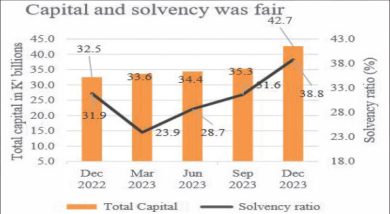‘Accurate analysis of devaluation critical’
 Malawi Government needs to carry out a ‘surgical precision analysis’ of the effects of the 49 percent devaluation of the kwacha and its subsequent floatation and immediately design mitigation measures to cushion Malawians from its negative impact.
Malawi Government needs to carry out a ‘surgical precision analysis’ of the effects of the 49 percent devaluation of the kwacha and its subsequent floatation and immediately design mitigation measures to cushion Malawians from its negative impact.
The views by a Blantyre-based commentator, Fredrick Changaya, in an interview with Business News last week come against the backdrop of rising commodities prices, high bank lending rates and liquidity shortages currently hitting consumers and companies as a consequence of the May 7 2012 monetary policy decision.
Malawi’s inflation rate for August 2012, according to the National Statistical Office (NSO), jumped 3.8 percentage points to 25.5 percent from 21.7 percent the month before, against government’s annual average projection of 18.4 percent.
Bank’s lending rates are hovering at just above 40 percent following the Reserve Bank of Malawi’s (RBM) hiking of the bank rate—the rate at which commercial banks borrow from the central bank—to 21 percent from 16 percent in July.
In their weekly market update, Nico Asset Managers Limited observes that liquidity challenges still persist with the average discount window borrowing for last week dropping to K13.7 billion (about $45.7 million) per day from last week’s average of K15.6 billion (about $52 million) when the noncollaterised borrowing rate for stressed banks is at 23.5 percent.
But Changaya, who is also chief operations officer for Candlex (Malawi) Limited, called for post devaluation analysis that can identify potential critical control points where, if adjusted, could lead to more than proportionate improvement in the effects.
He said devaluation impacts negatively on the common person than the elite.
“To make matters worse, such a man is in what I call a maize economy that earn income by selling his subsidised maize; hence, lower commodity selling price while buying other life amenities in the inflationary market,†explained Changaya, however, adding that devaluation was a necessary evil.
RBM Governor Charles Chuka, early this month, told bankers at their annual celebration in Blantyre that devaluation of the local unit and its floatation has increased prices of goods, but not by the margins being talked about.
“The real effect of currency adjustments comes through the rate of inflation – that’s what measures the average change in prices and, thus, the loss in purchasing power for the nation as a whole.
“This explains the acceleration of inflation from 12.4 percent in April to 21.7 percent in July. By the way, urban inflation rose from 15.5 percent to 25.1 percent during the period,†explained Chuka, adding they estimate inflation to be between 21 percent and 24 percent by end-year with an average of between 17.5 percent and 19.8 percent for the year.
While saying devaluation was not wrong, Changaya noted that the jig-saw puzzle has to be tackled to ensure that the most vulnerable people are cushioned from the negative effects of the monetary policy.
He called on government economists and economic think-tanks to come up with the root cause profile of devaluation and necessary measures of containing the impact.
Changaya suggested that government should zero-rate important basic commodities that are essential at a family level so that people do not bear the burden of inflation and to some extent devaluation.
“Commodities that people depend on heavily at household level should be subsidised on short-term so that they remain affordable,†he added, stressing that government should bar importation of some products which can be manufactured in Malawi.
The Joyce Banda administration has agreed to roll-out an 18-month-plus Economic Recovery Plan (ERP) with the hope of cushioning Malawians from the economic problems being experienced.




